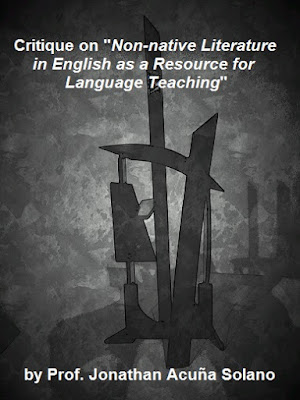Critique on “Non-native Literatures in English as a Resource for Language Teaching”
By Prof. Jonathan Acuña Solano
Sunday, June 7, 2015
Twitter: @jonacuso
Post 174
Brumfit
(1986) describes “an attempt to reject ‘set books’ approach to teaching
literature” and suggests “to develop with students an attitude to works of
literature.” The problem with Brumfit’s idea is that, though he wants to give
learners freedom of choice when it comes to selecting literary pieces, he
continues to circumscribe students within the idea that “we should teach real English literature” (Kachru, 1980),
an idea that many literature instructors hold. However, Kachru (1986) proposes
a very different way of dealing with literary studies: the use of non-native
English texts in the classroom.
What
are the benefits of using a corpus of literary works that include non-native
English texts? For Kachru (1980), the inclusion of non-native texts imply relevant
areas of “ethnography of communication, language pragmatics, and the sociology
of language.” In the eyes of Kachru (1980), nativization
or the use of English by non-native speakers to write literature can also
expose non- and native readers to lexical
innovations, translation equivalences, contextual redefinition, and rhetorical and functional styles. “The
use of such non-native literary texts, then, provides a challenge not only to
the non-native teachers and learners, but also to teachers and learners who use
English as their native language” (Kachru, 1980).
If
non-native literary texts were included in a course syllabus or school
curricula, would it have an impactful effect? The imminent result of the use of
this kind of literatures is that learners can also be trained cross-culturally
or even intra-culturally. In the case of the Costa Rican teaching context,
several pieces have been written by members of the Afro-Costa Rican community
that can enrich our mestizaje
heritage. For example, Dixon (2004) focuses on the “literary contributions of
Afro-Costa Rican writers and how their treatment of place, language and nation
configure a cultural identity that is no longer West Indian and is in
contestation with the dominant Europeanized culture of Costa Rica.” The
promising of using non-native literary texts is immense and potentially
fruitful in many senses.
As
Kachru (1980) concludes, the use of this kind of literatures provides learners,
“a repertoire of resources for providing linguistic and cross-cultural
explanations.” Students can then be exposed to how English is modified,
innovation in writing styles and its effect on comprehension, and “what is
meant by acculturation on English in
‘non-English’ social and cultural contexts” (Kachru, 1980).
Brumfit,
C. (1986). Wider Reading for Better
Reading: An alternative approach to teaching literature. Literature and
Language Teaching. Edited by Brumfit & Carter. Oxford: OUP
Dixon,
K. (2004). Mestizaje and Racial
Categories as Hegemonic Forms of Representation in Costa Rican Literature.
A Contra Corriente. Spring 2004 at http://www.ncsu.edu/acontracorriente/spring_04/Dixon.pdf
Kachru, B. (1980). Non-native Literatures in English as a
Resource for Language Teaching. RELC Journal December 1980 11: 1-9, doi:10.1177/003368828001100201











Literature-based learning means that you are taking a bit more time to teach your kids, but it’s a quality time well spent. Growing your relationship by spending time with your kid curled up hooked into a great book. Students sometimes say that it is impossible to study for the Literature exam. However, in my experience, students usually do have a fairly clear understanding of what they can do to prepare. Students can contact online websites and applications to learn better. Students can also hire online literature tuition for advance preparation. Thanks for this beneficial article.